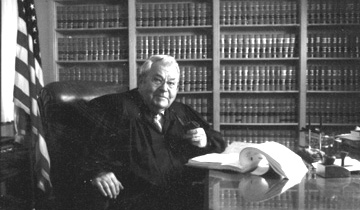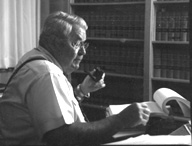THE HONORABLE EDWARD DEAN PRICE
1911-1997
Senior United States District Judge
Eastern District of California

A TRIBUTE
by Arnold P. Peter, Vice-President
Legal and Business Affairs
Labor Relations
Universal Studios Hollywood
The judicial branch has neither the power of the sword nor the purse. Therefore, as Hamilton
states in the Federalist,
the judiciary must rely on persuasion and moral judgment "to secure a steady, upright, and
impartial administration of
the laws." Dean Price pursued justice along a path that was often the less traveled and, in the
highest traditions of the
federal judiciary, rendered his judicial duties with passion, without regard for politics or
popularity.
The poet Louis Untermeyer perhaps described the self of Dean Price:
Ever insurgent let me be,
Make me more daring than devout;
From sleek contentment keep me free,
And fill me with a buoyant doubt.
Open my ears to music; let
Me thrill with Spring's first flutes and drums-
But never let me dare forget
the bitter ballads of the slums.
|
Ever insurgent in seeking justice, Dean Price heard both the sweet music of the Spring and the
sullen ballads of the
slums.
It is said in the Talmud, that the world rests upon three ideals: truth, justice and peace. The
Talmudic rabbis admonish
that these three ideals are but one for when justice is done, the truth becomes an actuality and
peace becomes a reality.
In striving to do justice, one pursues truth and peace. Edward Dean Price refused to compromise
in his pursuit of
justice.
Biographical Information
 Edward Dean Price was born in Sanger, California, in February of 1919. He was raised on a
farm in the Sanger area.
He earned his Bachelor's degree from the University of California, Berkeley, in 1947, taking
classes while serving as a
Staff Sergeant for the United States Army. He received his Juris Doctorate from the University of
California School of
Jurisprudence two years later. In 1949 he joined the law firm of Cleary & Zeff in Modesto. The
firm became Zeff,
Halley & Price in 1954 after he became a name partner. He remained with that law firm 25
years, until 1979. The firm
was later known as Price, Martin & Crabtree.
Edward Dean Price was born in Sanger, California, in February of 1919. He was raised on a
farm in the Sanger area.
He earned his Bachelor's degree from the University of California, Berkeley, in 1947, taking
classes while serving as a
Staff Sergeant for the United States Army. He received his Juris Doctorate from the University of
California School of
Jurisprudence two years later. In 1949 he joined the law firm of Cleary & Zeff in Modesto. The
firm became Zeff,
Halley & Price in 1954 after he became a name partner. He remained with that law firm 25
years, until 1979. The firm
was later known as Price, Martin & Crabtree.
During his 30 years of private practice Judge Price also served as a part-time United States
Magistrate in Modesto,
California. He had numerous professional achievements, distinguished by his active status as a
member of the
American Bar Association, a Fellow of the American College of Trial Lawyers, and a member of
the American Board
of Trial Advocates. He served on the State Bar of California Board of Governors 1975 to 1976,
was on the Advisory
Board and Governing Committee of the Continuing Education of the Bar during 1963 to 1971
and the Judicial Council
of California during 1978 and 1979. He performed pro bono activities serving as the Chairman
of the Salvation Army
Advisory Committee.
His community activities included Rotary International, where he served as President in 1978 to
1979, the Benevolent
and Protective Order of Elks where he served as Exalted Ruler in 1959 to 1970, and the Del Rio
Golf & Country Club
and the Modesto Lions 500 Club, where he served as President in 1953.
Edward Dean Price was appointed to the Federal Bench by President Jimmy Carter in 1979. He
took senior status and
became a Senior Judge of the United States District Court for the Eastern District of California
December 31, 1989.
His seat on the Court of the Eastern District was vacant until May 30, 1991, when his successor
took the oath of office.
Judge Price is survived by his wife, Katherine M. Merritt Price, three children, Katherine
O'Brien, Edward M. Price,
and Janey Price. Judge Price was a student of the law and committed to exacting and meticulous
practice before his
Court. Judge Price maintained cordial relations with court staff and particularly the United
States Marshals. During
his career, Judge Price was assigned a high risk interstate drug trafficking case that required 24
hour, around-the-clock
protection for him and his family. During this period of time, United States Marshals
accompanied Judge Price
everywhere and even maintained a post at his residence. The Marshals held Judge Price in high
esteem, as he was
always sensitive to the rigors of their job. Judge Price kept his residence in Modesto, as well as a
residence in Fresno,
during the 18 years he served the Federal Court.
Judge Price was particularly committed to the disadvantaged and persons who lacked the
resources to participate in
court cases. He strongly believed in equal access to justice for all. Judge Price was a committed
student of the law. He
enjoyed the intellectual challenge of judging. He was a supporter of and participant in legal
educational programs to
advance the competence of practice among lawyers and judges and the training of law students.
He used his extensive background as a practicing lawyer and insight into the trial process to
streamline and efficiently
try the most complex of cases. As a case manager, Judge Price insisted that lawyers be prepared,
know their cases, and
meet the high ethical standards he required of himself and all who appeared before the court.
During Judge Price's term, the court experienced growth in caseloads from under 300 cases per
judge when he arrived,
to well in excess of 500 cases per judge at the time he took senior status. When his successor
was not immediately
appointed, Judge Price continued to carry a full caseload for a year and one-half, and even after
his successor was
commissioned, continued to carry a criminal caseload that materially assisted the other judges
with the very large case
load in the Fresno Division of the Eastern District.
Source: A speech by Judge O.W. Wanger to the Fresno County Bar Association
RETURN TO CourtHistory.org.
© 2001 United States District Court for the Eastern District of California Historical Society.


 Edward Dean Price was born in Sanger, California, in February of 1919. He was raised on a
farm in the Sanger area.
He earned his Bachelor's degree from the University of California, Berkeley, in 1947, taking
classes while serving as a
Staff Sergeant for the United States Army. He received his Juris Doctorate from the University of
California School of
Jurisprudence two years later. In 1949 he joined the law firm of Cleary & Zeff in Modesto. The
firm became Zeff,
Halley & Price in 1954 after he became a name partner. He remained with that law firm 25
years, until 1979. The firm
was later known as Price, Martin & Crabtree.
Edward Dean Price was born in Sanger, California, in February of 1919. He was raised on a
farm in the Sanger area.
He earned his Bachelor's degree from the University of California, Berkeley, in 1947, taking
classes while serving as a
Staff Sergeant for the United States Army. He received his Juris Doctorate from the University of
California School of
Jurisprudence two years later. In 1949 he joined the law firm of Cleary & Zeff in Modesto. The
firm became Zeff,
Halley & Price in 1954 after he became a name partner. He remained with that law firm 25
years, until 1979. The firm
was later known as Price, Martin & Crabtree.